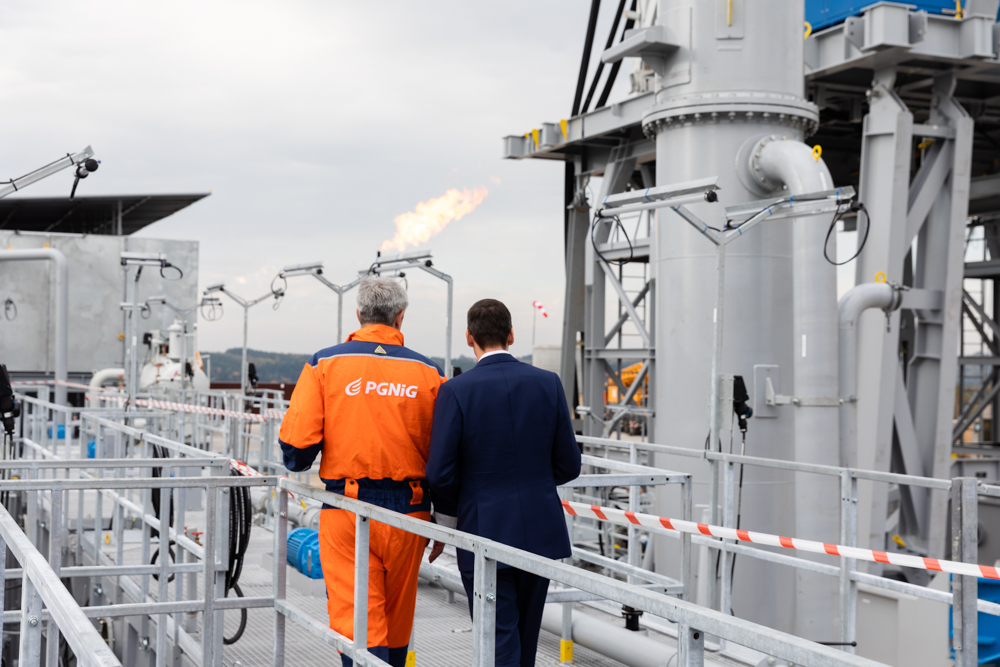By Wojciech Kość
Poland’s state-controlled oil and gas company PGNiG won an arbitration lawsuit against the Russian gas giant Gazprom over the latter’s charging exorbitant prices for supplies of the commodity, PGNiG said on Monday.
The decision by the Stockholm Arbitration Tribunal orders the Russian company to pay back 6 billion zloty (€1.31 billion) to PGNiG for charging it prices that did not reflect the realities of the gas market. The decision is retroactive, meaning Gazprom will have to settle the difference between the market and its inflated pricing since 1 November 2014.
PGNiG said it had already begun work to ensure that Gazprom pays back the overpaid money.
The decision by the arbitration tribunal gives PGNiG better pricing conditions – although not for long. Poland has long said it will not renew its current gas supply contract with Gazprom when it expires in 2022 because pricing is just one problem with it.
The other is geopolitics. Warsaw considers being tied to supplies from a country it considers hostile – also to Poland’s neighbours like the Baltic states or Ukraine – a security issue.
Russian gas currently covers some 60% of Poland’s annual demand of some 18 billion cubic metres, a far greater dependency than in the case of coal, which tends to make headlines more often.
PGNiG is likely to use the capital it will receive from Gazprom to step up efforts in weaning Poland off Russian imports altogether. “We plan to use the funds we will recover from Gazprom to purchase new hydrocarbons deposits”, PGNiG’s CEO Jerzy Kwieciński said in a statement on Monday.
The 6 billion zloty that Gazprom is expected to pay now will be a huge boost, said Jakub Wiech, an energy journalist.
“[This money] can support PGNiG’s investment projects, and there will be many of those – primarily projects related to LNG supplies, construction of transmission networks or obtaining methane from coal mines,” Wiech told Notes from Poland.
“The Warsaw government strongly emphasises the importance of diversifying gas supplies. It also wants Poland to become a gas hub for the CEE, an important geopolitical goal for the United Right [coalition of Law and Justice with two minor parties],” he added.
Poland has already made some big steps in securing gas supplies form directions other than Russia.
Since 2016, Poland has operated an LNG terminal – named after the late President Lech Kaczyński – in the north-western coastal town of Świnoujście. The facility is capable of handling 5 billion cubic metres of LNG a year, and is currently being expanded to 7.5 billion cubic metres.
Poland is also building the Baltic Pipe, a gas link from PGNiG-operated fields in the Norwegian Sea via Denmark to Poland. The pipeline is expected to go online in 2022 – the year the Gazprom contract expires – and supply 10 billion cubic meters of gas annually.
Poland also wants to build a floating LNG terminal in the Bay of Gdańsk and has a long-term supply contract with the world’s largest gas producer Qatar for approximately 2 billion cubic metres of gas a year until 2042. Finally, Warsaw has signed LNG supply deals with the US, keen to export its supplies, abundant since the shale gas boom.
Come 2022, however, and Poland might still face tough questions on Russian gas. Gazprom is not going to let go of a large market easily, claims Wiech.
“If Poland’s diversification plans succeed, Russians will offer gas supplies at very attractive prices in 2022. Gazprom will do this in order not to get pushed out of the Polish market and therefore not to lose influence. That is what Russians did in Lithuania when it was working to implement its LNG terminal project in Klaipeda,” says Wiech.
“The Russian offer will be a serious dilemma for those in power, whoever they will be. If Poland holds onto the decision to end supplies from Russia is, it will face widespread propaganda, as Moscow will use its media to accuse Poles of mismanagement,” Wiech added.
The contract with Gazprom overhauled by the Stockholm Arbitration Tribunal – the so-called Yamal Contract, named after the Yamal Peninsula, Russia’s key gas production region – was signed in 1996. It assumes delivery of 10.2 billion cubic metres of gas annually.
Yet a controversial caveat in the contract is the so-called “take-or-pay” clause, under which PGNiG must pay for at least 8.7 billion cubic metres of gas annually, regardless of demand.
PGNiG and Gazprom may submit a price review request every three years if the Polish company considers the current price out of step with the market price level. PGNiG took advantage of that provision in late 2014, after which it sued Gazprom in the Stockholm Arbitration Tribunal.
Main photo credits: Adam Guz/KPRM/Flickr (under public domain)





















